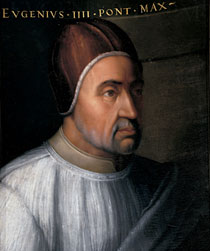Pope Eugene IV- Council of Florence
Bull of union with the Copts*
Session 11-4 February 1442
“It firmly believes, professes and teaches that the legal prescriptions of
the old Testament or the Mosaic law, which are divided into ceremonies,
holy sacrifices and sacraments, because they were instituted to signify
something in the future, although they were adequate for the divine cult
of that age, once our lord Jesus Christ who was signified by them had
come, came to an end and the sacraments of the new Testament had their
beginning. Whoever, after the passion, places his hope in the legal
prescriptions and submits himself to them as necessary for salvation and
as if faith in Christ without them could not save, sins mortally. It does
not deny that from Christ’s passion until the promulgation of the gospel
they could have been retained, provided they were in no way believed to be
necessary for salvation. But it asserts that after the promulgation of the
gospel they cannot be observed without loss of eternal salvation.
Therefore it denounces all who after that time observe circumcision, the
sabbath and other legal prescriptions as strangers to the faith of Christ
and unable to share in eternal salvation, unless they recoil at some time
from these errors. Therefore it strictly orders all who glory in the name
of Christian, not to practise circumcision either before or after baptism,
since whether or not they place their hope in it, it cannot possibly be
observed without loss of eternal salvation.”
* bull, papal (L. bulla, a seal) An important document issued by the pope
and sealed with a disk of lead called a “bulla,” whence derives the name.
Each bishop is appointed by a bull. Other major papal documents are often
called bulls, though they have various special names.
(Reference- The Maryknoll Catholic Dictionary, Compiled and Edited by
Albert J. Nevins, M.M., Dimension Books, Grosset & Dunlap, New York, N.Y., Copyright 1965.)
